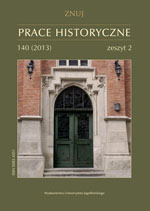Umbria i jej mieszkańcy wobec ekspansji rzymskiej w IV–II wieku p.n.e.
Umbria and Umbrians’ attitude towards the Roman expansion in 4th–2nd century BCE
Author(s): Maciej PiegdońSubject(s): History
Published by: Wydawnictwo Uniwersytetu Jagiellońskiego
Keywords: Umbria; Umbrians; Roman Republic; Roman Expansion; Colonisation; Roman Conquest
Summary/Abstract: This article is an attempt to present the role of the Roman Republic’s policies towards Umbrian tribes (in 4th–2nd century BCE) and show the effects of those policies. Umbria was initially an area inhabited by a mosaic of Umbrian’s tribes representing various levels of development. The policy of first conquering and then subordinating this area, as well as the powerful influence of Roman law, ideas, and cultural models, indicates not only the great military might of republican Rome but also the attractiveness of its civilization. Rome’s effectiveness resulted mainly from the fact that its actions complemented each other. After victorious military operations, or sometimes simultaneously with those operations, came settlement campaigns (colonies: Narnia, Interamna Nahars, Spoletium etc.) Rome was also a master of diplomacy. It mollified its recent enemies by concluding alliances (foederae with Camerinum, Ocriculum etc.) that created a system of friendly state and tribal organisms and enabled its citizens to live peaceably on the conquered territories. All these actions made it possible to subordinate the region, make the Roman presence permanent, and effectively repulse the invaders (Hannibal and his brother – Hasdrubal during the Second Punic War). The intensified settlement policy in Umbria and the expansion of its infrastructure (roads), facilitated economic contacts between Roman settlements and the centers of the subjugated, allied native tribes.
Journal: Prace Historyczne
- Issue Year: 140/2013
- Issue No: 2
- Page Range: 125-144
- Page Count: 20
- Language: Polish

